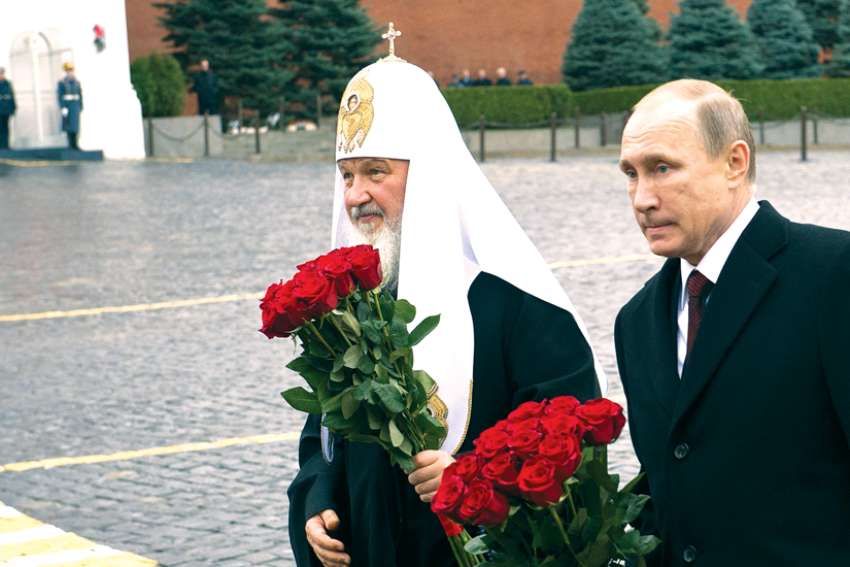Catholic and Orthodox denominations are calling for humanitarian assistance for those traumatized by the war who remain in Ukraine, and the two million and counting who have fled to neighbouring countries such as Poland and Moldova, said Fr. Deacon Andrew Bennett.
This is despite political differences that have plagued the Ukrainian Orthodox Church and split it into rival factions. Regardless of the current emergency, their relationship with the Russian Orthodox Church remains at the heart of unresolved tension between them.
“The Ukrainian Orthodox Church, which is in full communion with the Russian Orthodox Church, is in a difficult position, and Patriarch Kirill, the head of this church, has not explicitly condemned the attack on Ukraine,” Bennett said.
The roots of his anomalous position lie in the tangled history of Ukrainian nationalism and its links to denominational affiliation. Since Patriarch Kirill is the supreme head of the Russian Orthodox Church, and the Ukrainian Orthodox Church falls under his jurisdiction, both enjoy a privileged status with Russian President Vladimir Putin. It places the Ukrainian Orthodox Church at odds with a more nationalist-oriented denomination.
The latter is the Orthodox Church of Ukraine, Kiev Patriarchate, whose numbers increased significantly when thousands of Ukrainians, wishing to distance themselves from a church centred in Moscow, shifted their allegiance after the Russian invasion of 2014.
Nevertheless, the Russian Patriarch has joined other church leaders in appealing to pastors and laity “to provide all possible assistance to all victims, including refugees, people left without shelter and means of subsistence,” according to Religion News Service. But over 275 of the clerics of his church, uneasy with his tacit approval of the war, have signed an open letter calling for “the cessation of the fratricidal war against Ukraine.”
The Ukrainian Greek Catholic Church, of which Bennett is a member, is a Byzantine (Eastern) rite Catholic Church in full communion with the Roman Catholic Church.
Pope Francis called for a World Day of Prayer and fasting for Ukraine on Ash Wednesday. Although the Holy Father has not directly condemned Putin’s actions, he paid a personal visit to the Russian ambassador to the Holy See to ask about the situation in Donbas and Ukraine and expressed his concern about the humanitarian situation and conditions of the population. He reportedly urged for the care of children, the sick and the people who were suffering.
“This was a powerful gesture,” Bennett said, because it is breaking the norms of diplomatic protocol for a head of state such as the Pope to call on a foreign ambassador.
Bennett added that the Ukrainian Greek Catholic Church stands in full support of Ukraine and has directed its clergy to remain with the people in Ukraine in subways, church basements or wherever they are seeking refuge from exploding bombs, to minister to their spiritual and physical needs.
Several Catholic charities are working in overdrive to provide humanitarian assistance to those in dire straits.
“We are working with three partners on the ground to provide relief and on the ground support to displaced people and others,” said Anna Dombrovska, project officer for Ukraine at the Ottawa office of Catholic Near East Welfare Association (CNEWA). Three partners she mentioned are Caritas Ukraine, Ukrainian Catholic University and the Ukrainian Greek Catholic Church.
“We set up a direct appeal for funds, and Canadians have been most generous,” she said, pointing out that there is more at stake in this war than Ukraine’s sovereignty.
“Ukraine is a shield for democracy and for the Christian world, so it’s important to support it,” adding that if there is no more independent Ukraine left there would be no more freedom of expression or religion there.
Marie-Claude Lalonde, Canadian director of Aid to the Church in Need, said they are engaged in the same mission as other Catholic humanitarian organizations.
“We are now in the phase of enabling the local Church to take care of the population: for those fleeing, for elderly or poor people who can’t leave, for orphans,” Lalonde said. “We will need to continue helping even after the war is over as the war will have consequences for years to come.”


